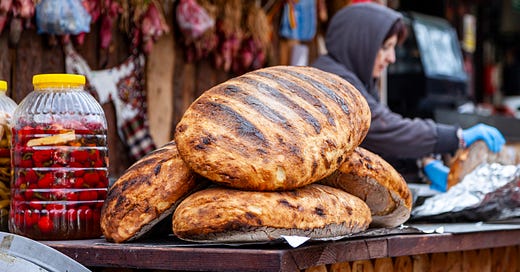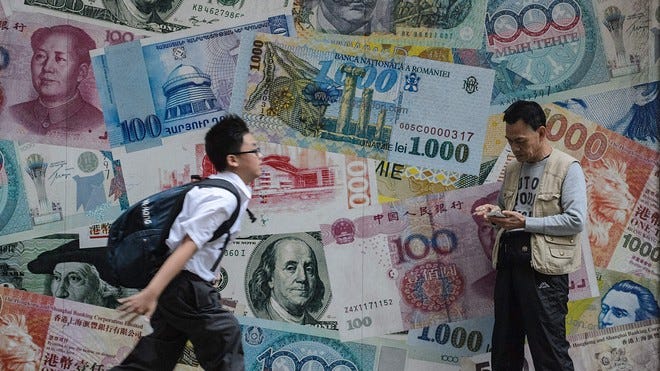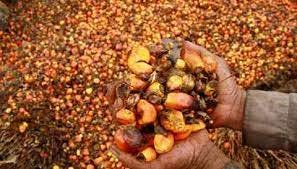Emerging Markets Daily - May 1
Fertilizer Crunch Spawns Food Insecurity, EM Currencies Tilt Downward, Saudi To Provide $8 B Aid to Pakistan, CAR Adopts Bitcoin, Jokowi Bans Palm Oil Exports
The Top 5 Stories Shaping Emerging Markets from Global Media - April 29-May 1
Historic Fertilizer Crunch Threatens Food Security. Is More Unrest Around the Corner?
Bloomberg
“…For the billions of people around the world who don’t work in agriculture, the global shortage of affordable fertilizer likely reads like a distant problem. In truth, it will leave no household unscathed. In even the least-disruptive scenario, soaring prices for synthetic nutrients will result in lower crop yields and higher grocery-store prices for everything from milk to beef to packaged foods for months or even years to come across the developed world. And in developing economies already facing high levels of food insecurity? Lower fertilizer use risks engendering malnutrition, political unrest and, ultimately, the otherwise avoidable loss of human life.”
“…Prices have been climbing for more than a year for a host of reasons: runaway pricing for natural gas, the main feedstock for much of the world’s nitrogen fertilizer; sanctions on a major Belarusian potash producer; back-to-back late-summer storms on the U.S. Gulf Coast that temporarily shut-in production in the region; plus Covid-19 restrictions that have disrupted every global supply chain, including chemicals.”
“Rising food prices, without a corresponding increase in incomes, have a long history of triggering social unrest. In 2008 and 2011, soaring inflation triggered food riots in more than 30 nations across Asia, the Middle East and Africa, helping to fuel uprisings in the Arab Spring.”
“‘That’s the big concern: Will the high prices of food have a boomerang reaction?’ said Gideon Negedu, executive secretary of the Fertilizer Producers and Suppliers Association of Nigeria and a member of the Presidential Fertilizer Initiative. ‘The food markets may begin to react to these prices because there is no commensurate increase in average household incomes.’” Bloomberg reports.
Pressure on Chinese Renminbi Hits Other EM Currencies
Financial Times
“China’s currency has fallen steeply against the dollar over the past two weeks, hit by the economic impact of the country’s Covid lockdowns, the war in Ukraine and the prospect of tighter US monetary policy.”
“But the renminbi has not moved in isolation: analysts warn it is dragging down other emerging market currencies with it, including those outside of the Asian manufacturing complex. With food and energy prices soaring, currencies of commodity-exporting emerging markets such as Brazil and South Africa are among the few to have gained any advantage from Russia’s invasion of Ukraine in late February.”
“Many such currencies also benefited from Chinese demand for industrial commodities, such as copper and iron ore, earlier this year. In April, however, the combination of China’s slowing economy and the global fallout of the war sent emerging-market currencies around the world into reverse.”
“Yerlan Syzdykov, global head of emerging markets at Amundi, says the proliferation of strict lockdowns in China is causing weakness across the economy. The worst-case scenario projected by Amundi’s analysts is that lockdowns will cause a 10 per cent reduction in manufacturing and an 18 per cent fall in steel production.”
“Amundi was bearish on Chinese growth before the recent lockdowns began. Its house view was for GDP growth this year to come in at almost a full percentage point below the IMF’s forecast of 4.4 per cent. But even that figure is now under pressure, said Syzdykov.” Jonathan Wheatley reports.
Pakistan Secures $8 Billion Aid Package from Saudi Arabia
The News (Pakistan)
“Pakistan has secured a ‘sizeable package’ of around $8 billion from Saudi Arabia, including doubling of the oil financing facility, additional money either through deposits or Sukuks and rolling over of the existing $4.2 billion facilities during the visit of Prime Minister Shehbaz Sharif.”
“…Prime Minister Shehbaz Sharif and his official entourage have left Saudi Arabia but Minister for Finance Miftah Ismail is still staying there to finalize the modalities of the increased financial package. Sharing the salient features of the financial package, the official said that Pakistan had proposed doubling of the oil facility from $1.2 billion to $2.4 billion and Kingdom of Saudi Arabia agreed to it. It was also agreed that the existing deposits of $3 billion would be rolled over for an extended period up to June 2023.”
“…Saudi Arabia had provided $3 billion deposits to the State Bank of Pakistan in December 2021 while the Saudi oil facility was operationalised from March 2022 whereby Pakistan was provided $100 million to procure oil. Saudi Arabia had provided a $7.5 billion package during the last tenure of the PMLN government (2013-18). Under the PTI-led regime, Saudi Arabia had provided a package of $4.2 billion, including $3 billion deposits and $1.2 billion oil facility for one year and linked it with the IMF programme.” Mehtab Haider reports.
Central African Republic Adopts Bitcoin as Legal Currency
Africa News
“The Central African Republic has adopted bitcoin as its official currency alongside the CFA franc…On 7 September 2021, El Salvador became the first country in the world to adopt bitcoin as a legal tender and the International Monetary Fund (IMF) immediately denounced the decision as dangerous for ‘financial stability, financial integrity and consumer protection’.”
"‘This move puts the Central African Republic on the map of the most courageous and visionary countries in the world,’ said the presidency of the Central African Republic.
“Already present since 2018, Russian paramilitaries have come to reinforce the Central African soldiers to repel the rebel offensive. However, the UN, international NGOs and France, the former colonial power, regularly denounce ‘crimes’ committed by ‘mercenaries’ of the Russian private security company Wagner, as well as by the rebellion>
"‘The context, with systemic corruption and a Russian partner under international sanctions, gives rise to suspicion,’ said Thierry Vircoulon, a specialist in Central Africa at the French Institute of International Relations (IFRI). ‘The search for ways to circumvent international financial sanctions by Russia invites caution,’ he continued.”
“For the time being, only El Salvador and the Central African Republic have adopted bitcoin as a legal tender, but other countries are considering doing so, with some having initiated legislative processes in this direction, according to the specialist site Coinmarketcap.com.”
“In Ukraine, the government has accepted donations in cryptocurrencies, raising more than $100 million in the early days of the conflict to fuel its war effort.” Africa News reports.
Jokowi Bans All Crude Palm Oil Exports Until Local Cooking Oil Prices Fall
Jakarta Globe
“Indonesia has stopped all palm oil and its derivatives exports to drive cooking oil prices to below $1 at local markets. President Joko ‘Jokowi’ Widodo announced the final decision on the export ban late on Wednesday, less than a day after his senior minister said the export ban would only affect the refined, bleached, deodorized, or RBD, palm olein, which is the raw material for cooking oil.”
“Indonesians have been struggling to buy cooking oil in the past few months, with some having to stand in line for hours to get their hand on just one or two liters of the oil. Local producers prefer to sell their products abroad, taking advantage of higher global commodity prices.”
“As the largest palm oil-producing country globally, it was ironic that Indonesians even had difficulty getting cooking oil, Jokowi said.”
“According to a political pollster Charta Politica, public satisfaction with the Jokowi administration's performance has been downward this year. In January 2022, the public satisfaction with the government was at 71.7 percent. Then it fell to 65.3 percent in February and 62.9 percent in April 2022.”
“The respondents in the Charta Politica survey pointed out that increasing basic needs prices, mainly the cooking oil, was their top concern in the past few months. 46.7 percent of the respondents said rising prices were the main problem that the government needed to tackle.”
“If we reject science, we reject the common man.” - Naguib Mahfouz






